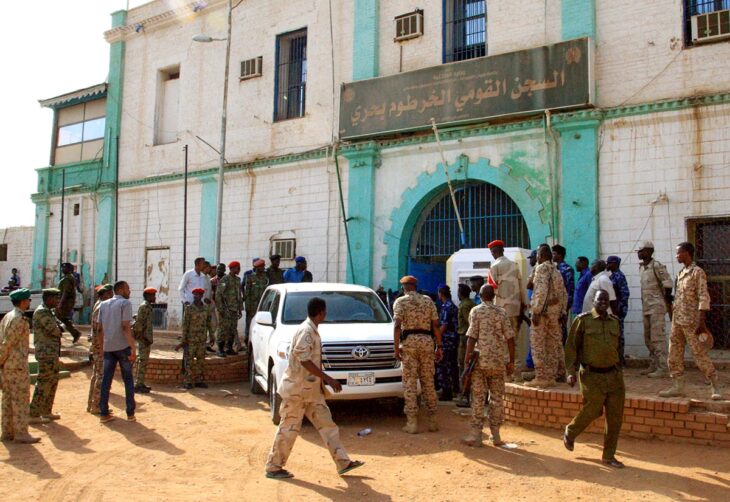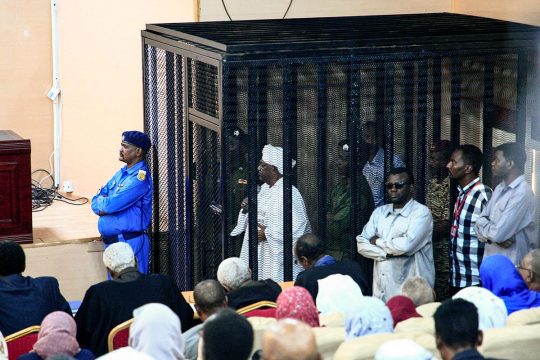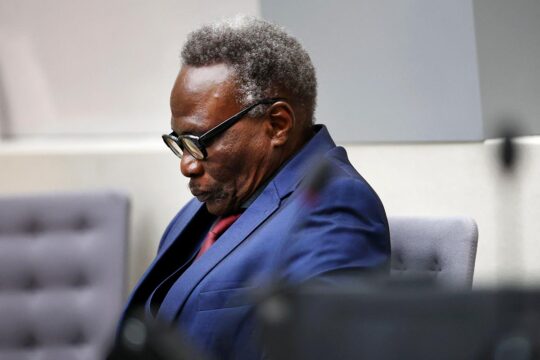How did the Kober detainees, who can be seen on several videos shared on social networks, get out of their cells on Sunday 23 April 2023? Did the guards decide that they could no longer take care of the detainees in the midst of explosions and bombings, without water, electricity or food?
The two protagonists of the current fighting in Sudan, the national army and the paramilitary Rapid Support Forces (RSF), blame each other. No one wants to take responsibility for what happened in Sudan's largest and most notorious prison, whose white and green walls have seen many political prisoners pass through.
This is because the issue goes beyond the release of hundreds of common criminals. Certainly, their release adds to the fear of the Sudanese capital’s inhabitants traumatized by the war of the two formerly allied generals -- Abdelfattah al-Bourhan, commander-in-chief of the army and head of the junta, and his former number two in the de facto government FRL head Mohamed Hamdan Dagalo, known as Hemetti.
The prison built under the British occupation on the eastern bank of the Blue Nile housed special prisoners. First and foremost was Omar al-Bashir, the former president of Sudan, who was deposed in April 2019 and is wanted by the International Criminal Court (ICC). His extradition to The Hague has been announced but never carried out. He is on trial in his country for corruption.
As soon as the escapes were announced, the question stirred the social networks: has he been released? Where is he? After a few hours, the army announced that it had transferred him to a military hospital in Omdurman, on the west bank of the Nile, a few days before. Since his imprisonment, Al-Bashir had been going back and forth between the prison and this hospital.
Two ICC suspects free
Several other high dignitaries of his regime were imprisoned there since his fall in April 2019, including two senior officials also wanted by the ICC: former defence minister Abdelrahim Hussein, under arrest warrant since March 1, 2012 on seven counts of crimes against humanity and six for war crimes committed in Darfur in 2003 and 2004; and Ahmed Haroun, former Minister of Interior and Humanitarian Affairs, Governor of North Kordofan and South Kordofan States, who is also wanted for war crimes and crimes against humanity.
It was he who, in a statement broadcast on 25 April on al-Tayba TV, announced their release: "We stayed under crossfire in Kober for nine days, even when there were no guards or prisoners left. But now we are responsible for our own protection.”
In addition to these people wanted by international justice, the "Kober group" includes some of the most important members of the National Congress Party (NCP), the backbone of Al-Bashir's military-Islamist regime. These include: vice-presidents Ali Osman Taha and Bakri Hassan Saleh, considered at the time as potential successors; the former head of the NISS, Sudan's powerful intelligence service, Nafi Ali Nafi; former parliamentary speaker Al-Fateh Ezzedine; and former oil minister Awad al-Jaz. All are being prosecuted for their involvement in the 1989 coup that brought Al-Bashir to power.
No ICC reaction
Since Haroun's public statement, these men have vanished into thin air. The ICC has not issued a statement expressing concern about the fate of the suspects whose transfer it has been seeking for years. When contacted by Justice Info, the ICC spokesperson responded soberly: "We are monitoring the situation but are not issuing any comment at this stage.”
The question remains as to who opened the doors. The army accuses the RSF, because such an action would fit the image that it wants to project of its enemy: not a paramilitary force planned in the last talks to be integrated into the regular army, but a militia made up of looters sowing chaos in the capital.
The RSF, who present themselves as defenders of a revolution against the Islamists of the former regime, accuse the army of being behind their release. "Freeing from prison the symbols of the former regime is part of the army's plan to bring the Islamists back to power," said a political adviser to the RSF, quoted by the Sudanese online newspaper Dabaga.
The army's goal: to reinstall an Islamist regime
Analyst Suliman Baldo, executive director of the Sudan Transparency and Policy Tracker, links the Kober releases to other events that took place in the big Omdurman prison a few days earlier. Thousands of inmates had fled after an assault on the prison. "An armed group released 35 NISS members sentenced to death and told the other inmates to go free. I got this from one of those prisoners. Al Bourhan has reconstituted the NISS special forces," he says.
The National Intelligence and Security Service (NISS), the secret service formerly under the direct orders of Al-Bashir, had been dismantled in 2019. But it did not completely disappear from the landscape: its former members are suspected of having acted undercover in most of the destabilisation operations of the transitional civilian government, from September 2019 to the military coup of October 2021.
And the security apparatus has been described as having strong links to the hardcore Islamists in Al-Bashir's party. "The Islamists are everywhere in the army. They have had plenty of time in 30 years of power to ensure that every student recruited by the military school is from their ranks," Baldo continues. “They don't care about the ICC, the objective is to get their leaders back to reinstall the Islamist regime. That's what this war is about.”
The future of the transitional justice cases, for which a hypothetical agreement was expected in early April, will therefore depend on the outcome of the current conflict. "If the army prevails, the leadership will strengthen the hand of the former regime, then the issue of justice wouldn’t be discussed properly," says Abdulsalam Sayyed Ahmed, a transitional justice expert who has worked for the United Nations. "If it ends in negotiations that succeed in restoring the political process, then the issue of justice will once again come onto the agenda. Then the options, including the issue of the ICC, will be explored."







